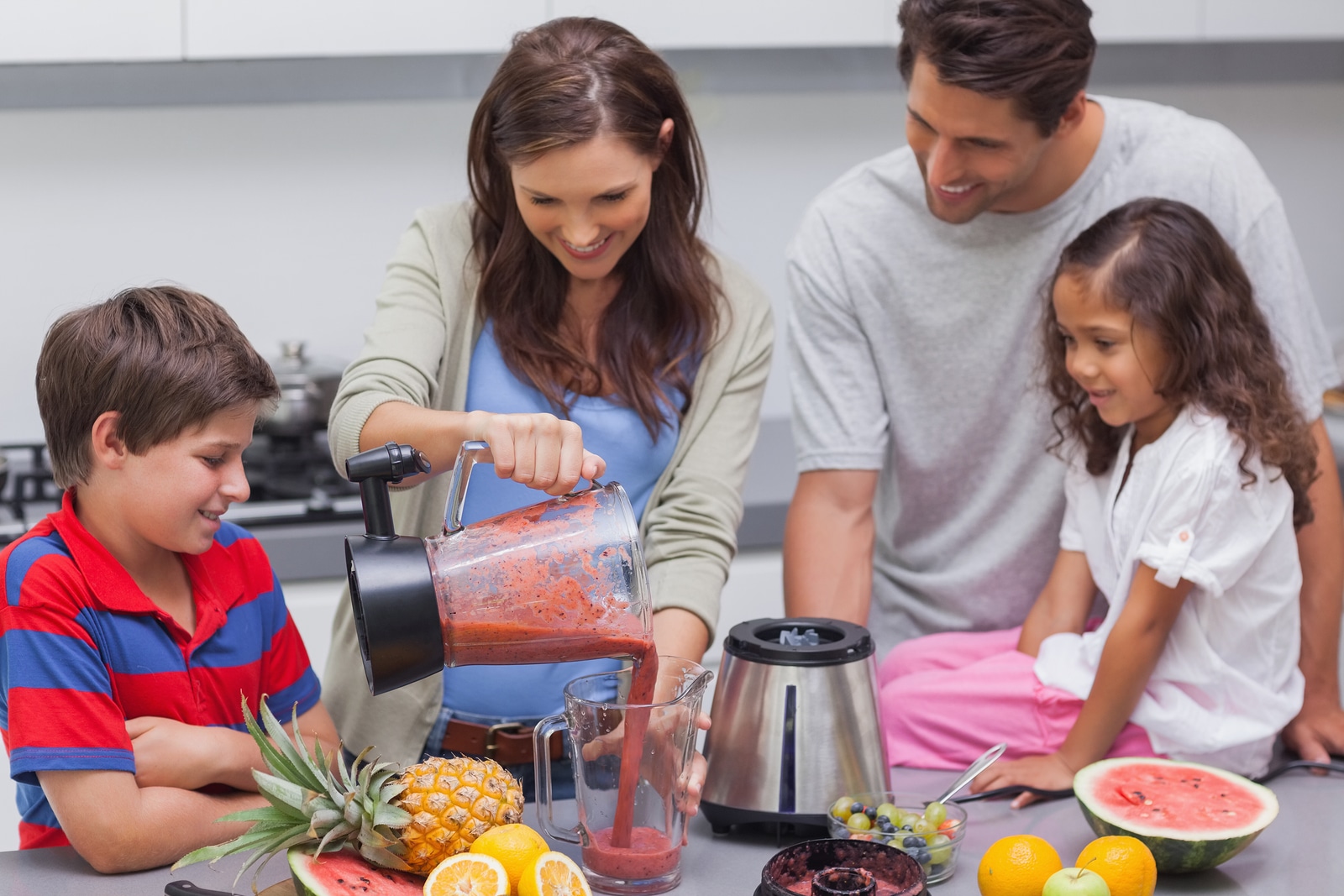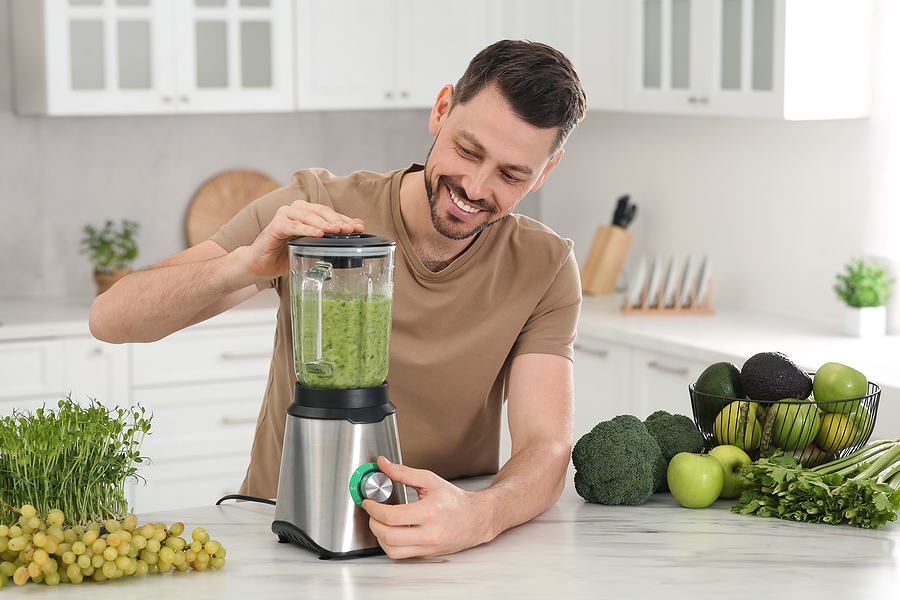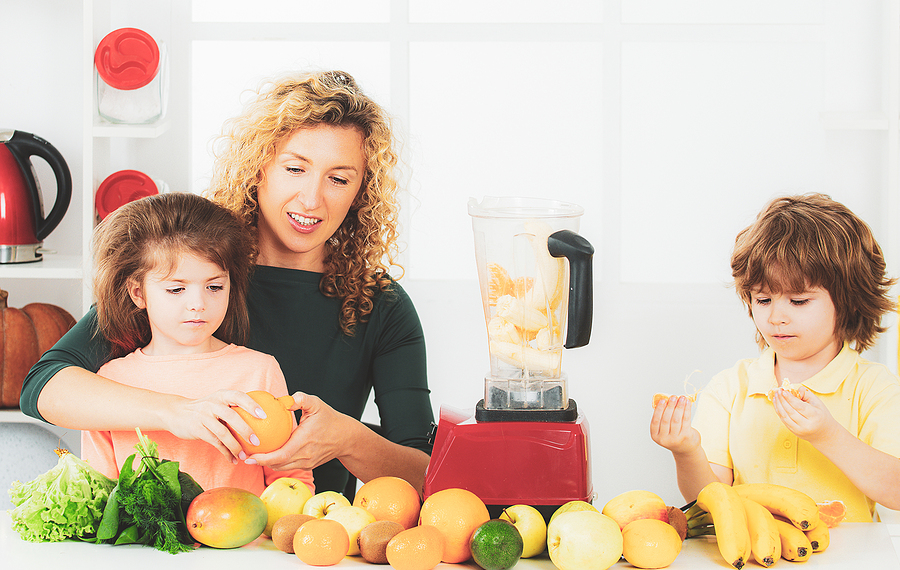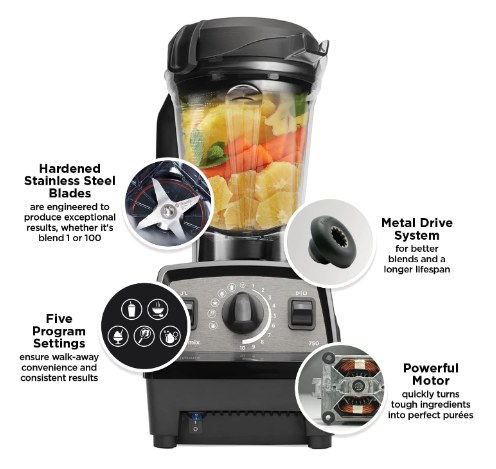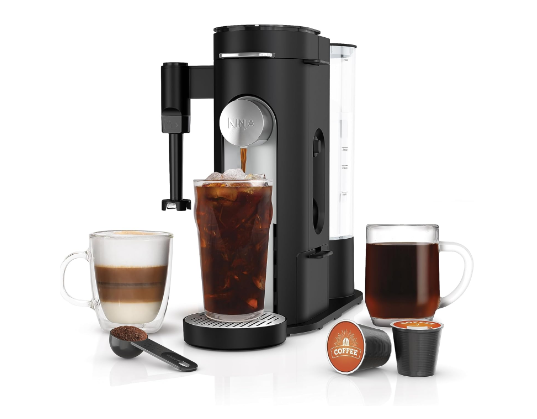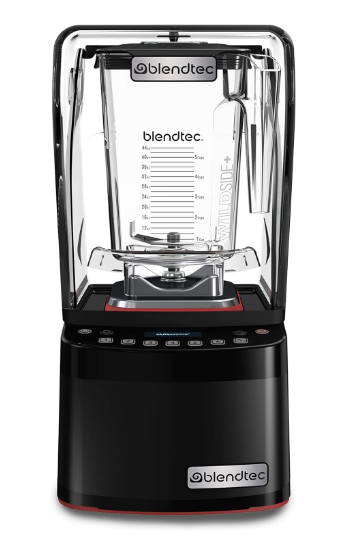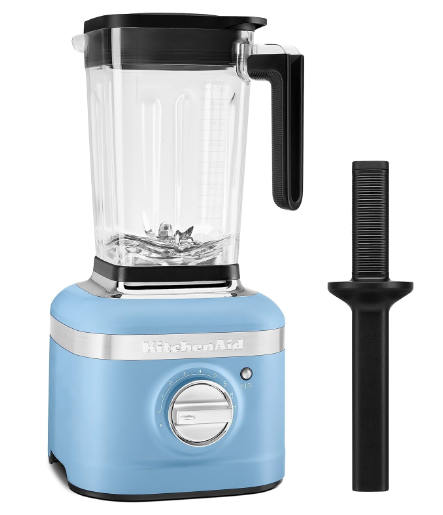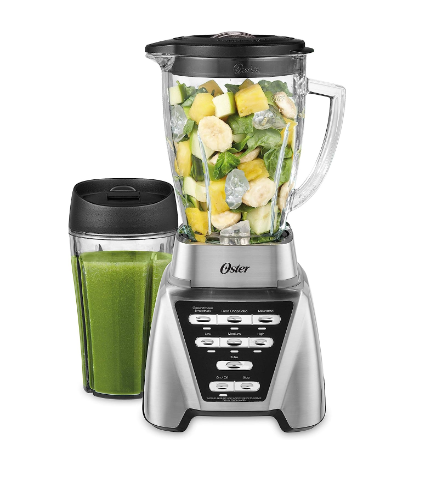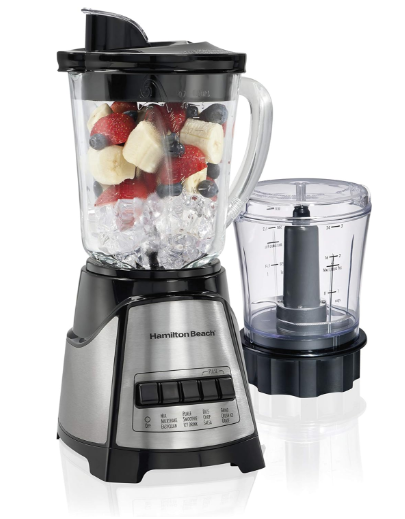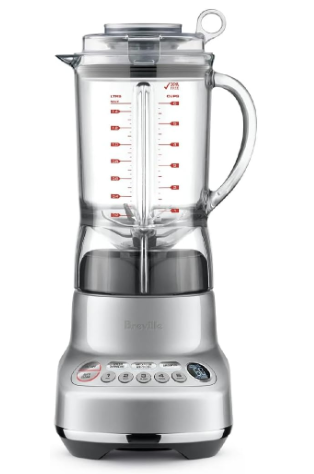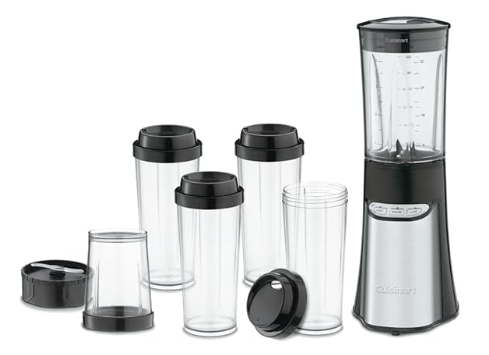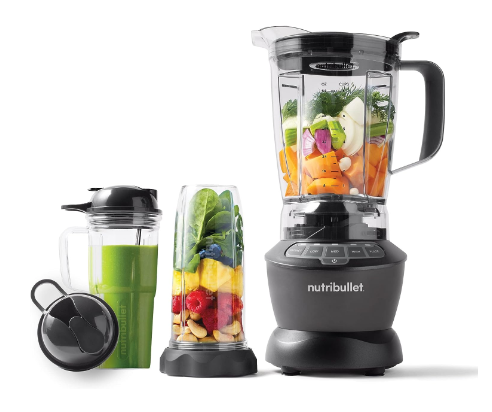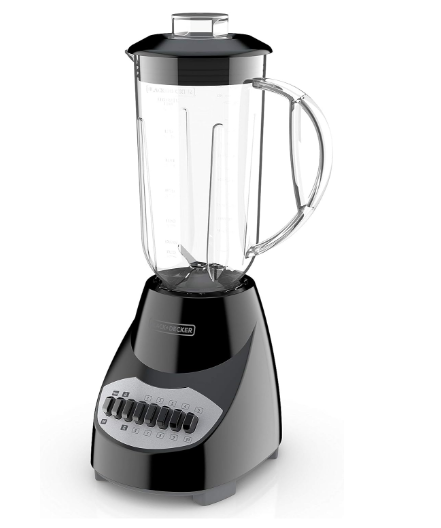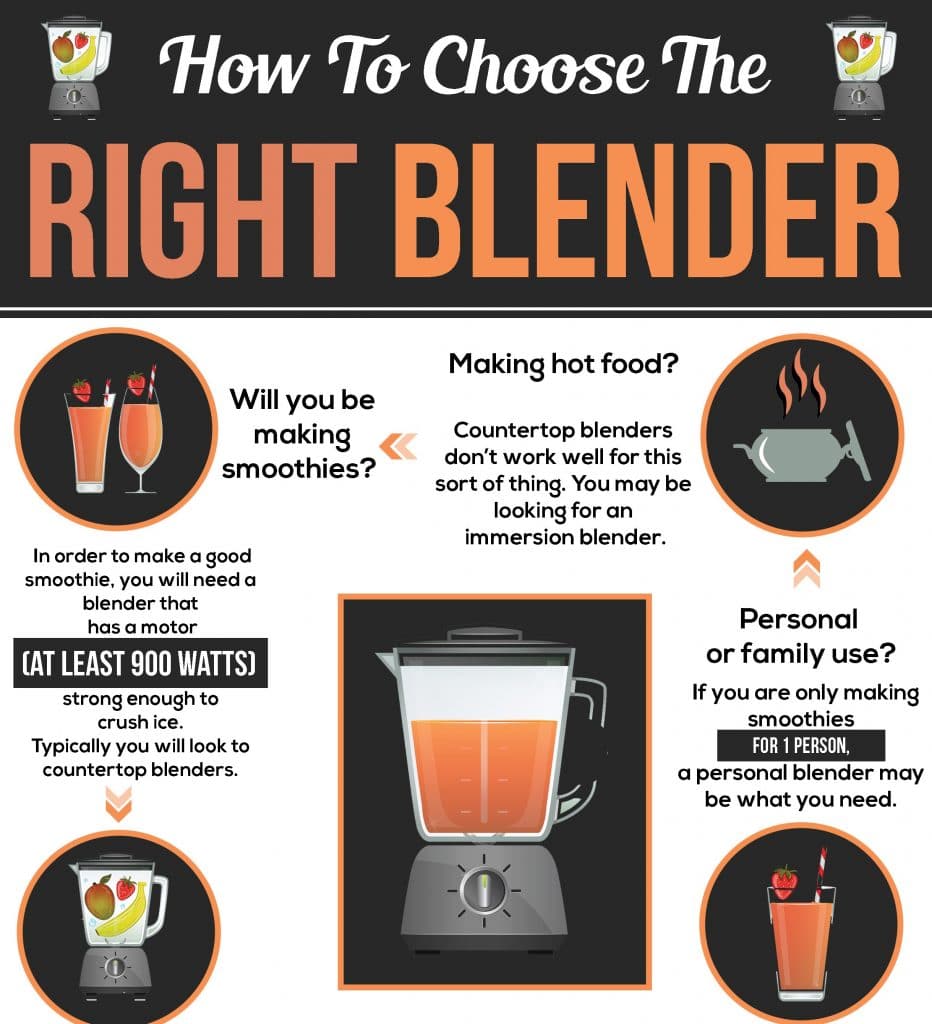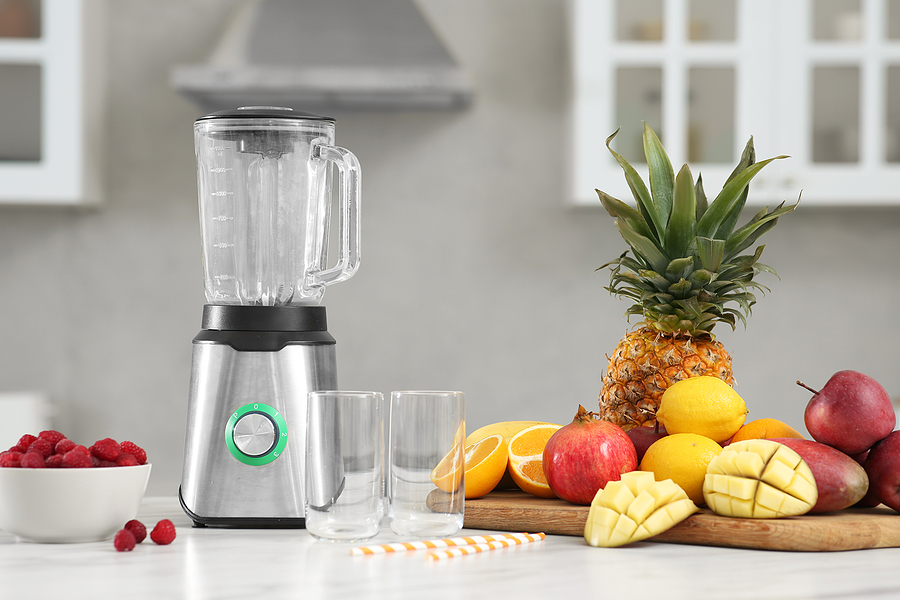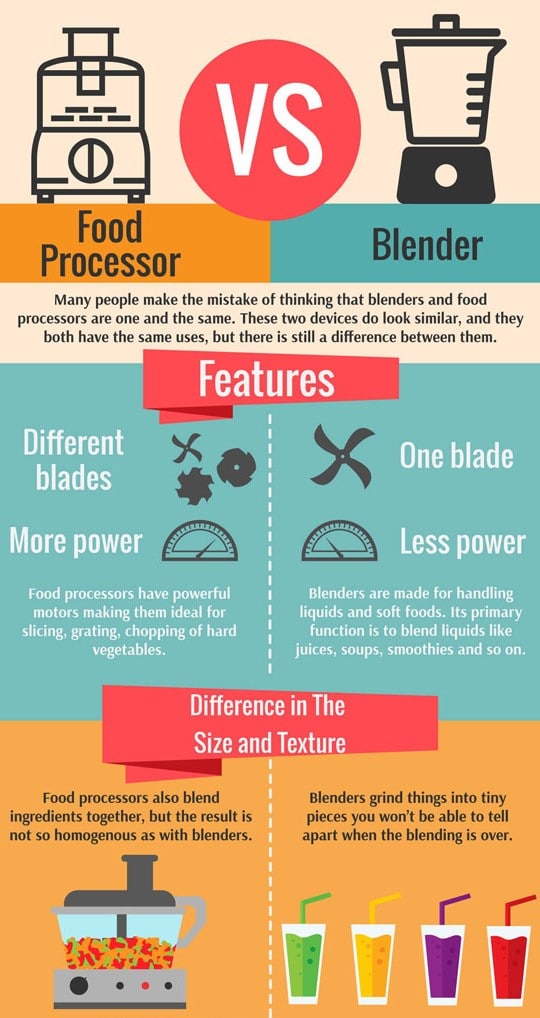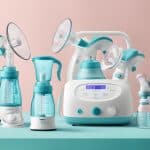How to Choose the Best Blender for You
Before buying any blender, do your homework: research, read consumer reviews, and compare for the best deal. With a little effort, you’ll find a righteous beast that serves you well.
Before you select a blender, ask yourself the following questions:
What’s my budget?
How powerful does my blender need to be?
How much space do I have?
How many people am I blending for?
Many of these blenders come with accessories if you’re into baubles and bonuses. As you rely on your blender for culinary creations, don’t be surprised if stuff breaks or wears out over time. For your basic needs, a lower price-point blender can do the trick. But as I mentioned above, you’ll want to upgrade when finances allow. Another benefit of high-speed blenders is that they’re better at pulverizing produce and extracting more nutrients from the fiber/pulp. They’re also good at blending trickier ingredients like nuts and the aforementioned dates. FYI—soaking your nuts (I always laugh when I type that) and dates makes them easier to blend.
Okay, smoothie, sweetheart, you now have all the info you need to purchase a wise blender. Go forth and blend, blend, blend!
A Blender Buyer’s Guide is an essential tool for anyone looking to purchase a blender. With so many options on the market, choosing the right one for your needs can be overwhelming. This guide will provide an overview of the different types of blenders available, their features, and what to consider when purchasing. Blenders are versatile kitchen appliances used for various tasks, from making smoothies and soups to crushing ice and pureeing vegetables. There are several types of blenders, including personal, countertop, and immersion blenders.
Each class has unique features and benefits, so it’s essential to understand the differences before purchasing. When choosing a blender, there are several factors to consider, such as the size, the power of the motor, and the type of blades. Other features to look for include the number of speed settings, the ease of cleaning, and the overall durability of the blender. Considering these factors, you can find the perfect blender to meet your needs and make delicious, healthy meals and snacks at home.
Understanding Blenders
Blenders are versatile kitchen appliances used to make various foods and drinks. They work by blending ingredients with sharp blades that rotate at high speeds. Understanding the different types of blenders, their power and capacity, and their material and design can help you choose the right blender for your needs.
Types of Blenders
Several types of blenders are available on the market, each with unique features and benefits.
- Countertop Blenders: These are the most common blenders designed to sit on a kitchen countertop. They are typically more extensive and more potent than other types of blenders, making them ideal for blending harsh ingredients like ice and frozen fruit.
- Personal Blenders: These blenders are smaller and designed for individual use. They are perfect for making single servings of smoothies and other blended drinks.
- Immersion Blenders: Handblenders are handheld appliances that blend ingredients directly in a pot or bowl. They are ideal for making soups, sauces, and other recipes that require mixing while cooking.
Top Blender Brands
When choosing a blender, the brand plays a significant role in determining the quality, durability, and performance. Here are some of the top blender brands that you can consider:
1. Vitamix
The Vitamix blender is a high-performance blender designed to blend, chop, puree, and grind various foods and ingredients. It is known for its powerful motor and durable design, making it a popular choice for home cooks and professional chefs.
One of the critical features of the Vitamix blender is its variable speed control, which allows users to adjust the blender’s speed to achieve the desired consistency for their recipes. The blender has various blades and attachments, including a tamper tool that helps push ingredients down to the edges for a smoother blend.
In addition to its blending capabilities, the Vitamix blender can make hot soups, frozen desserts, and even nut butter. It is also easy to clean, with a self-cleaning function that simplifies cleaning the blender afterward.
Overall, the Vitamix blender is a versatile and powerful kitchen tool that is perfect for anyone who loves to cook and wants to experiment with different recipes and ingredients. Its high-quality construction and range of features make it an excellent investment for anyone serious about their cooking.
2. Ninja
The Ninja blender is a powerful kitchen appliance designed to blend, chop, puree, and grind various foods and ingredients. It is known for its high-speed motor and multiple blades, making it a popular choice for home cooks and professional chefs.
One of the critical features of the Ninja blender is its Total Crushing Technology, which allows it to blend even the toughest ingredients with ease. The blender also comes with multiple blades and attachments, including a food processor bowl and a single-serve cup, making it a versatile tool for various kitchen tasks.
In addition to its blending capabilities, the Ninja blender can make smoothies, soups, sauces, and even dough. It is also easy to clean, with dishwasher-safe components that simplify cleaning the blender afterward.
Overall, the Ninja blender is a powerful and versatile kitchen tool perfect for anyone who loves to cook and wants to experiment with different recipes and ingredients. Its high-quality construction and range of features make it an excellent investment for anyone serious about their cooking.
3. Blendtec
The Blendtec blender is a high-performance kitchen appliance designed to blend, chop, puree, and grind various foods and ingredients. It is known for its powerful motor and durable design, making it a popular choice for home cooks and professional chefs.
One of the critical features of the Blendtec blender is its powerful motor, which can easily blend even the toughest ingredients with ease. The blender has various blades and attachments, including a tamper tool that helps push ingredients down to the edges for a smoother blend.
In addition to its blending capabilities, the Blendtec blender can make hot soups, frozen desserts, and even nut butter. It is also easy to clean, with a self-cleaning function that simplifies cleaning the blender afterward.
Another unique feature of the Blendtec blender is its SmartBlend technology, which automatically adjusts its speed and power based on the blended ingredients. This helps to ensure that the blender is continually operating at the optimal level for the best results.
Overall, the Blendtec blender is a powerful and versatile kitchen tool perfect for anyone who loves to cook and wants to experiment with different recipes and ingredients. Its high-quality construction and range of features make it an excellent investment for anyone serious about their cooking.
4. KitchenAid
The KitchenAid blender is a versatile kitchen appliance designed to blend, chop, puree, and grind various foods and ingredients. It is known for its powerful motor and unique design, making it a popular choice for home cooks and professional chefs.
One of the critical features of the KitchenAid blender is its Intelli-Speed Motor Control, which automatically adjusts the blender’s speed and power based on the blended ingredients. This helps to ensure that the blender is continuously operating at the optimal level for the best results.
The blender has various blades and attachments, including a tamper tool that helps push ingredients down to the edges for a smoother blend. It is also easy to clean, with dishwasher-safe components that simplify cleaning the blender afterward.
In addition to its blending capabilities, the KitchenAid blender can make hot soups, frozen desserts, and even nut butter. It also has a Soft Start feature that helps prevent splattering and messes.
Overall, the KitchenAid blender is a powerful and versatile kitchen tool perfect for anyone who loves to cook and wants to experiment with different recipes and ingredients. Its high-quality construction and range of features make it an excellent investment for anyone serious about their cooking.
5. Oster Pro 1200 Blender
The Oster Pro 1200 Blender is a powerful blender designed for home use. It has a 1200-watt motor can easily blend even the toughest ingredients, like ice and frozen fruit. The blender comes with a 6-cup Boroclass glass jar that is scratch-resistant and dishwasher safe. The pot also has a wide mouth, making adding ingredients while blending easy.
In addition to the glass jar, the Oster Pro 1200 Blender also comes with a 24-ounce smoothie cup and a food processor attachment. The smoothie cup is perfect for making single-serving drinks, and the food processor attachment is excellent for making dips and sauces.
The blender has seven-speed and three pre-programmed smoothies, milkshakes, and salsa settings. The blender also has a pulse feature that lets you quickly chop and blend ingredients.
Overall, the Oster Pro 1200 Blender is an excellent choice for anyone looking for a powerful blender that can handle a variety of ingredients. It is also affordable and has various accessories, making it a versatile kitchen appliance.
6. Hamilton Beach Power Elite Blender
The Hamilton Beach Power Elite Blender is a versatile, affordable blender perfect for making smoothies, frozen drinks, and more. It has a powerful 700-watt motor can easily blend even the toughest ingredients, like ice and frozen fruit. The blender comes with a 40-ounce glass jar that is dishwasher safe and has easy-to-read measurement markings.
The Hamilton Beach Power Elite Blender has 12 different blending functions: mix, puree, chop, and grind. It also has a pulse feature that lets you quickly chop and blend ingredients without overmixing. The blender also has a unique Wave-Action system that pulls elements into the blades for smooth and consistent blending.
The blender has a sleek, modern design that will look great in any kitchen. It also has a cord storage compartment that makes it easy to store when not in use. The Hamilton Beach Power Elite Blender is an excellent choice for anyone looking for an affordable and versatile blender that can handle a variety of ingredients.
7. Breville BBL620 Fresh & Furious Blender
The Breville BBL620 Fresh & Furious Blender is a high-performance blender perfect for making smoothies, soups, and more. It has a powerful 1100-watt motor can easily blend even the toughest ingredients, like ice and frozen fruit. The blender comes with a 50-ounce glass jar that is dishwasher safe and has easy-to-read measurement markings.
The Breville BBL620 Fresh & Furious Blender has nine different speed settings and a pulse feature that lets you quickly chop and blend ingredients. It also has pre-programmed settings for smoothies, green smoothies, and ice crushing. The blender also has a unique Kinetix blade system that pulls elements into the blades for smooth and consistent blending.
The blender has a sleek, modern design that will look great in any kitchen. It also has a cord storage compartment that makes it easy to store when not in use. The Breville BBL620 Fresh & Furious Blender is an excellent choice for anyone looking for a high-performance blender that can handle a variety of ingredients. It is also easy to use and clean, making it a convenient kitchen appliance.
8. Cuisinart CPB-300 SmartPower Blender
The Cuisinart CPB-300 SmartPower Blender is a compact and versatile blender perfect for making smoothies, shakes, and other drinks on the go. It has a powerful 350-watt motor can easily blend even the toughest ingredients, like ice and frozen fruit. The blender has a 32-ounce blending jar, four 16-ounce travel cups, and a food processor attachment.
The Cuisinart CPB-300 SmartPower Blender has four-speed settings and a pulse feature that lets you quickly chop and blend ingredients. It also has pre-programmed settings for smoothies and ice-crushing. The blender also has a unique blade system that combines elements quickly and evenly.
The blender has a compact and modern design that will look great in any kitchen. It also has a cord storage compartment that makes it easy to store when not in use. The Cuisinart CPB-300 SmartPower Blender is an excellent choice for anyone looking for a compact and versatile blender that can handle a variety of ingredients. It is also easy to use and clean, making it a convenient kitchen appliance for always on the go.
9. NutriBullet NBR-1201 12-Piece High-Speed Blender
The NutriBullet NBR-1201 12-piece High-Speed Blender is a powerful, compact blender perfect for making smoothies, shakes, and other drinks. It has a 600-watt motor can easily blend even the toughest ingredients, like ice and frozen fruit. The blender comes with a 24-ounce cup, an 18-ounce cup, and a 12-ounce cup, all made of BPA-free plastic and dishwasher safe.
The NutriBullet NBR-1201 12-piece High-Speed Blender has a unique blade design that blends ingredients quickly and evenly. Its pulse feature also allows you to chop and mix ingredients rapidly. The blender also comes with two blades, one for blending and one for grinding.
The blender has a compact and modern design that will look great in any kitchen. It also has a cord storage compartment that makes it easy to store when not in use. The NutriBullet NBR-1201 12-piece High-Speed Blender is an excellent choice for anyone looking for a compact and powerful blender that can handle a variety of ingredients. It is also easy to use and clean, making it a convenient kitchen appliance.
10. Black+Decker Crush Master 10-Speed Blender
The Black+Decker Crush Master 10-Speed Blender is affordable and versatile for making smoothies, shakes, and other drinks. It has a powerful 550-watt motor can easily blend even the toughest ingredients, like ice and frozen fruit. The blender comes with a 6-cup glass jar that is dishwasher safe and has easy-to-read measurement markings.
The Black+Decker Crush Master 10-Speed Blender has ten different speed settings and a pulse feature that allows you to chop and blend ingredients quickly. It also has a unique blade design that incorporates elements quickly and evenly.
The blender has a sleek, modern design that will look great in any kitchen. It also has a cord storage compartment that makes it easy to store when not in use. The Black+Decker Crush Master 10-Speed Blender is an excellent choice for anyone looking for an affordable and versatile blender that can handle a variety of ingredients. It is also easy to use and clean, making it a convenient kitchen appliance.
Overall, these top blender brands offer quality, durability, and performance that you can rely on. When choosing a blender, consider your needs, budget, and preferences to find the best one.
Blender Power and Capacity
When choosing a blender, power and capacity are essential factors to consider. The power of a blender is measured in watts and determines how quickly and effectively it can blend ingredients. A higher-wattage blender will be able to combine more challenging ingredients like ice and frozen fruits with ease. However, a blender with lower wattage may also need help handling these ingredients and may require more time and effort to blend. The capacity of a blender refers to the amount of elements it can hold and blend at once. The power of a blender is measured in cups or liters. A giant capacity blender is ideal for those who want to simultaneously make large batches of smoothies, soups, or sauces. However, a big blender may take up more space on the countertop and may not be suitable for those with limited kitchen space.
It is essential to consider both power and capacity when choosing a blender. A high-power blender with a large capacity is ideal for those who frequently make large batches of smoothies or soups. However, if you only plan to use your blender occasionally or for smaller batches, a lower-wattage blender with a smaller capacity may suffice. It is also essential to consider the size of the blender and how it will fit on your countertop or kitchen cabinets. Choosing power and capacity will ultimately depend on your specific blending needs and preferences. Consider your budget, frequency of use, and the ingredients you plan to blend when deciding.
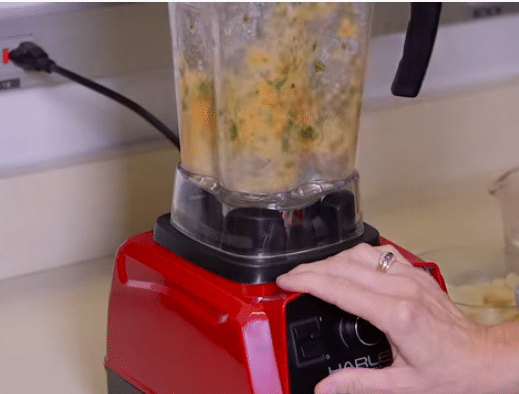
Blender Material and Design
Blender material and design are essential factors to consider when choosing a blender. The blender’s material can affect its durability, ease of cleaning, and overall performance. Plastic, glass, and stainless steel are the most common blender materials. Plastic blenders are lightweight and affordable, making them popular for many consumers. However, they may not be as durable as glass or stainless steel and may be prone to scratches and stains.
Glass blenders are more durable than plastic and are easy to clean. They are also more resistant to scratches and stains. However, if dropped, glass blenders can be heavy and more prone to breakage. Stainless steel blenders are the most durable and long-lasting option. They are easy to clean and are resistant to scratches and stains. However, they are often more expensive than plastic or glass blenders.
In addition to material, the blender’s design can affect its performance and ease of use. Blenders with a broader base and shorter height tend to be more stable and less prone to tipping over during use. Blenders with a broader mouth can also make adding ingredients and cleaning the blender easier. Choosing between blender material and design will ultimately depend on your specific needs and preferences. Consider your budget, frequency of use, and the ingredients you plan to blend when deciding. A well-designed blender made from durable materials can provide years of reliable performance and make blending a breeze.
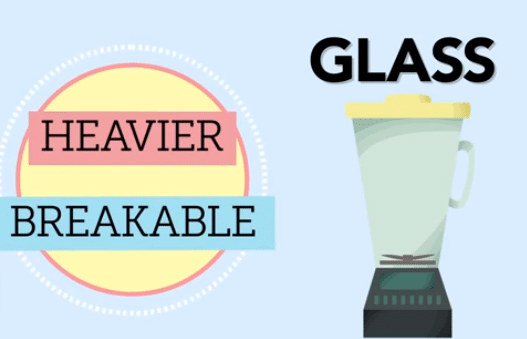
Key Features to Consider
When choosing a blender, several key features must be considered to ensure you get the best blender for your needs. These features include blade quality, speed settings, ease of cleaning, and noise level.
- Blade Quality – The quality of a blender’s blade is crucial to its performance. High-quality blades are typically made from stainless steel or other durable materials designed to chop, blend, and puree ingredients quickly and efficiently. Look for sharp, sturdy edges and able to handle harsh ingredients like ice and frozen fruit.
- Speed Settings – The speed settings of a blender are another critical factor to consider. Most blenders come with multiple speed settings, allowing you to easily adjust the speed based on the type of ingredients you are blending. Look for blenders with at least three-speed settings, including a low rate for delicate components and a high speed for more challenging elements.
- Ease of Cleaning – Blenders can be challenging to clean, so choosing one that is easy to disassemble and clean is essential. Look for blenders with removable blades and dishwasher-safe jars for easy cleaning. Some blenders also come with self-cleaning functions that make cleaning even more accessible.
- Noise Level – Blenders can be noisy, so if you plan on using your blender frequently, consider the noise level. Look for blenders with noise-reducing features, such as sound enclosures or dampening technology. Some blenders also come with quieter motors that produce less noise overall.
When choosing a blender, it’s essential to consider your specific needs and preferences. Considering the key features mentioned above, you can find a blender that meets your needs and provides high-quality blending performance.
Blender Maintenance Tips
To ensure that your blender lasts for years, it’s essential to take good care of it. Here are some tips to help you maintain your blender:
Cleaning
Cleaning your blender after each use is essential to keep it in good working condition. Here’s how to clean your blender:
- Disassemble the blender: Remove the blades, gasket, and jar from the motor base.
- Rinse the jar and blades: Rinse the pot and blades under running water to remove leftover food particles.
- Clean the gasket: Use a soft sponge or cloth to clean the gasket, making sure to remove any food residue.
- Clean the motor base: Wipe the motor base with a damp cloth, careful not to get water inside the motor.
Storage
Proper storage is also essential to keep your blender in good condition. Here are some tips for storing your blender:
- Keep it dry: Store your blender in a dry place to prevent moisture from damaging the motor.
- Keep it covered: Cover your blender with a clean cloth or towel to protect it from dust and other debris.
- Store it upright: Store your blender upright to prevent the blades from becoming dull.
Blade Maintenance
The blades are the most critical part of your blender, so keeping them in good condition is essential. Here are some tips for maintaining your blender blades:
- Sharpen the blades: Over time, the edges may become dull. Run them under hot water and then dry them with a towel to sharpen them.
- Replace the blades: If the edges become damaged or dull, it’s essential to replace them. Check your blender’s manual for instructions on how to do this.
By following these maintenance tips, you can ensure that your blender will continue working correctly for years.
What Are the Benefits of Using a Blender
Blenders are versatile kitchen appliances that can be used for various tasks. From making smoothies and shakes to pureeing soups and sauces, blenders offer many benefits to home cooks and professional chefs. Here are some of the top benefits of using a blender:
- Time-saving: Blenders can help you save time in the kitchen by quickly and easily blending ingredients. Whether making a smoothie or pureeing a soup, a blender can do the job in seconds.
- Nutrient retention: Blending fruits and vegetables can help retain their nutrients and fiber, which can be lost during other cooking methods like boiling or frying. This makes blenders an excellent tool for making healthy and nutritious meals.
- Smooth texture: Blenders create soft, creamy textures in foods like soups, sauces, and dips. This can make your dishes more enjoyable and give them a more professional look and feel.
- Easy to use: Blenders are generally very easy to use, with straightforward controls and settings that make them accessible to everyone, regardless of cooking experience.
- Versatile: Blenders can be used for various tasks, from making smoothies and shakes to grinding nuts and spices. This makes them a valuable tool in any kitchen.
- Cost-effective: Blenders are relatively inexpensive compared to other kitchen appliances, making them an excellent investment for home cooks and professional chefs.
- Easy to clean: Most blenders are easy to clean, with removable blades and dishwasher-safe parts. This makes them a convenient and low-maintenance tool to have in the kitchen.
- Creative freedom: Blenders allow you to get creative in the kitchen, experimenting with new recipes and flavor combinations. This can help you expand your culinary skills and create unique and delicious dishes.
Blenders are a versatile and valuable tool that benefits home cooks and professional chefs alike. Whether making smoothies, soups, sauces, or dips, a blender can help you save time, create smooth textures, and get creative in the kitchen.
Food Processor vs. Blender
Many people make the mistake of thinking that blenders and food processors are the same. These two devices look similar and have the same uses, but they still differ.
Conclusion
After extensive research and analysis, it is clear that the best blender for your needs depends on your specific requirements and budget. For those seeking a high-end blender with powerful performance and advanced features, the Vitamix 5200 and Blendtec Designer 725 are excellent options. These blenders can easily blend harsh ingredients and come with various preset programs and speed settings. However, they come with a high price tag and may not be suitable for those on a tight budget.
For those looking for a mid-range blender with good performance and versatility, the Ninja Professional Blender and NutriBullet Pro are great choices. They offer powerful blending capabilities and come with various attachments and accessories for different blending needs. They are also more affordable than high-end blenders, making them an excellent value. The Oster Pro 1200 and Hamilton Beach Power Elite are perfect options for those on a tight budget. They offer decent performance and come with a range of features at an affordable price. However, they may not be as durable or long-lasting as high-end blenders.
Ultimately, the best blender for your needs depends on your specific requirements and budget. Consider your blending needs, frequency of use, and budget before purchasing. With the right blender, you can easily enjoy delicious and healthy smoothies, soups, and sauces at home.

